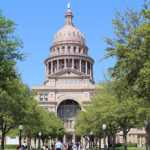“But to you who are listening I say: Love your enemies, do good to those who hate you, bless those who curse you, pray for those who mistreat you. If someone slaps you on one cheek, turn to them the other also. If someone takes your coat, do not withhold your shirt from them. Give to everyone who asks you, and if anyone takes what belongs to you, do not demand it back. Do to others as you would have them do to you.” — Jesus (Luke 6:27-31)
 Marv KnoxIn stark contrast to how much they love to wave the Christian flag while spouting God talk, Gov. Greg Abbott and the majority of Texas legislators sure do enjoy ignoring the clear teachings of Jesus. What part of “Do unto others as you would have them do unto you” don’t they understand?
Marv KnoxIn stark contrast to how much they love to wave the Christian flag while spouting God talk, Gov. Greg Abbott and the majority of Texas legislators sure do enjoy ignoring the clear teachings of Jesus. What part of “Do unto others as you would have them do unto you” don’t they understand?
The Legislature passed and Abbott signed Senate Bill 4, the law that outlaws so-called sanctuary cities in Texas. In effect, it deputizes all Texas law enforcement officers as federal immigration agents. Beyond that, it threatens them with escalating fines if they fail to cooperate with federal agents by not retaining noncitizens who are subject to deportation.
The portion of the law that drew the greatest protest allows law enforcement officers to question the immigration status of a person who is detained, even including during a traffic stop, rather than limiting that authority to occurrences during lawful arrest.
Opposed by business, law enforcement
The law drew protests from business leaders, who fear it will cause out-of-state corporations and organizations to shun moving facilities to Texas or holding events in the state, ultimately harming the economy.
More tellingly, the state’s law enforcement leaders opposed the bill because it puts undocumented residents at risk of harm, particularly from people and organized groups who would prey on their vulnerability. For example, they will be unlikely to call police for everything from violent crime to unfair business practices if they know they could be deported because of an interaction with police.
“We officers work extremely hard to build and maintain trust, communication and stronger relationships with minority communities through community-based policing and outreach programs,” noted a statement from the Texas Major Cities Chiefs, composed of the police chiefs in Dallas, Houston, Austin, Arlington, Fort Worth and San Antonio, as well as the Texas Police Chiefs Association.
“Broad rules, such as those imposed by SB 4, that push local law enforcement to take a more active role in immigration enforcement will further strain the relationship between local law enforcement and these diverse communities. … Such a divide between the local police and immigrant groups will result in increased crime against immigrants and in the broader community, create a class of silent victims, and eliminate the potential for assistance from immigrants in solving crimes or preventing crime.”
Sign up for our weekly edition and get all our headlines in your inbox on Thursdays
Understandable logic
Protests from police and business leaders aside, support for the sanctuary cities ban is understandable on at least two levels. First is the apparent majority of Texans’ perception of fairness, and second is concern for safety.
The sanctuary cities ban seems fair because it targets undocumented residents, people who live in Texas illegally. “If they’re already breaking the law,” the thinking goes, “then any means of bringing them to justice and deporting them is justifiable.” (Christians are chief among rule-followers. A new LifeWay Research survey shows only 26 percent of Christians are likely to consider whether someone gets hurt when deciding between right and wrong.)
The ban also addresses safety, because supporters of the law—such as Gov. Abbott in the statement he made when he signed the bill—claim undocumented residents threaten the well-being of citizens and other legal residents.
Those are straightforward lines of reasoning, which can be followed and understood.
Litany of failure
But just because they reflect their own logic does not make them right, and it certainly doesn’t mean they reflect the teachings of Jesus, whom so many of the bill’s backers loudly claim to adore.
• The sanctuary cities ban fails Jesus’ command: “Do unto others as you would have them do unto you.” Would any of the bill’s backers want to be treated this way? Would they want to be put at risk—and their families put at risk—by a law that makes them fear law enforcement so much they would not feel free to report rape, assault, robbery and the like?
• The sanctuary cities ban fails Jesus’ evaluation: “Truly I tell you, whatever you did not do for one of the least of these, you did not do for me” (Matthew 25:45).
• The sanctuary cities ban fails the mandate of the Old Testament law and prophets: The duty of God-honoring people is to protect the outsider in their midst.
• The sanctuary cities ban fails human decency: It offers punishment—particularly ongoing vulnerability to powerful predators—far disproportionate to the crime.
• The sanctuary cities ban exposes Texas’ hypocrisy: For decades, our economy has thrived upon the toil of undocumented workers. From construction, to petroleum, to agriculture, undocumented workers have lifted the fortunes of all of us. Subjecting them to forces that would prey upon them and bureaucratic structures that would tear their families apart is sleazy and callous.
We can hope and pray the courts will determine the sanctuary cities ban also is unconstitutional: The Fourth Amendment to the U.S. Constitution prohibits unlawful search and seizure. Perhaps that will apply to protecting someone from being deported for changing lanes without turning on a blinker.
If Texans refuse to follow the Golden Rule, maybe the courts at least will force us to follow the Constitution.
Follow Marv on Twitter: @marvknoxbs














We seek to connect God’s story and God’s people around the world. To learn more about God’s story, click here.
Send comments and feedback to Eric Black, our editor. For comments to be published, please specify “letter to the editor.” Maximum length for publication is 300 words.